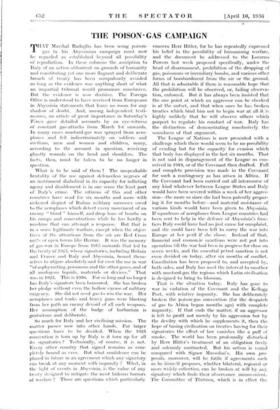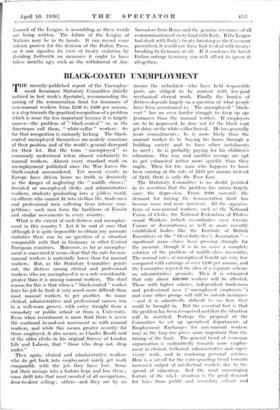THE POISON - GAS CAMPAIGN THAT Marshal Badoglio has been using
poison- -I 'gas in his Abyssinian campaign must now be regarded as established beyond all possibility of repudiation. In these columns the ascription to Italy of an action abhorrent on grounds of humanity and constituting yet one more flagrant and deliberate breach of treaty has been • scrupulously avoided so long as the evidence was anything short of what an impartial tribunal would pronounce conclusive. But the evidence is now decisive. The Foreign Office is understood to have received from Europeans in Abyssinia statements that leave no room for any shadow of doubt. And, among independent testi- monies, an article of great importance in Saturday's Times gave detailed accounts by an eye-witness of constant gas-attacks from March 1st onwards. In many cases mustard-gas was sprayed from aero- planes and fell indiscriminately on soldiers and civilians, men and women and children, many, according to the account . in question, receiving ghastly wounds on the head and shoulders. The facts, then, must be taken to be no longer in question.
What is to be said of them ? The unspeakable brutality of the use against defenceless negroes of an instrument diabolical in its capacity for inflicting agony and disablement is in one sense the, least part of ,Italy's crime. The citizens of this and other countries have read for six months and more with sickened disgust of Italian military successes owed to the aeroplanes which detect every movement of an enemy " blind " himself, and drop tons of bombs on his camps and concentrations while he has hardly a machine that can attempt a response. But that is in a sense legitimate warfare, except when the objec- tives of the attentions from the air arc Red Cross. units or open towns like Harrar. It was the memory of gas-war in Europe from 1915 onwards that led to the treaty of 1925, whose signatories, including Britain and. France and Italy and Abyssinia, bound them- selves to abjure absolutely and for ever the use in war "of asphyxiating, poisonous and the other gases, and of all analogous liquids, materials or devices." That was in 1925. This is 1936. For so long and no longer has Italy's signature been honoured. She has broken her pledge without even the hollow excuse of military exigency. She did not need gas to win the war. Her aeroplanes and tanks and heavy guns were blasting from her path an enemy devoid of all such weapons. Her assumption of the badge of barbarism is gratuitous and deliberate.
So much for Italy and her civilising mission. The matter passes now into other hands. Far larger questions have to be decided. When the 1925. convention is torn up by Italy is it torn up for all its signatories ? Technically, of course, it is not. Every other country that signed remains as com- pletely bound as ever. But what confidence can be placed in future in an agreement which any signatory, can break at any moment with impunity ? What, in. the light of events in Abyssinia, is the _value of a-ny. treaty designed to mitigate the most hideous horrors,. of warfare ? Those are questions, which particularly- concern Herr Hitler, for he has repeatedly expressed his belief in the possibility of humanising warfare, and the document he addressed to the Locarno Powers last week proposed specifically, under the head of disarmament, prohibition of the dropping of gas, poisonous or incendiary, bombs, and various other forms of bombardment from the air or the ground. All that is admirable if there is reasonable hope that the prohibition will be observed, or,. failing observa- tion, enforced. But it has always been insisted that the one point at which an aggressor can be checked is at the outset, and that when once he has brolim treaties which bind him not to begin war at all, it is highly unlikely that he will observe others which purport to regulate his conduct of war. Italy has the distinction of demonstrating conclusively, the soundness of that .argument.
The League of Nations is now presented with a challenge which there would seem to be no possibility of evading but for the capacity for evasion which that body has displayed in the last six months. That is not said in disparagement of the League as con- ceived in 1919, or of the Covenant then drafted. ,Full and complete provision was made in the Covenant, for such a contingency as has arisen in Africa.. If the Covenant had been carried out all intercourse of any kind whatever between League States and Italy would have been severed within a. week of.her aggres-. sionthe more so since she had been patently, prepar- ing it for months before—and material assistance: ot various kinds would, have been given to AbysSipia,, If squadrons of aeroplanes from League countries had' been sent to help in the defence of Abyssinia's fron- tiers Italy could have had no just cause for complaint, and she could have been left to carry the war into Europe at her peril if she chose. Instead of that, financial and economic sanctions were not put into operation till the war had been in progress for close on seven weeks, and the essential petrol sanction is not even decided on today, after six months of conflict. Conciliation has been proposed to, and accepted by, both sides, and Italy has used the interval to smother with mustard-gas the regions which Latin civilisation is designed to bring to blossom.
That is the situation today. Italy has .gone to war in violation of the. Covenant and the Kellogg Pact, with relative impunity. She has deliberately broken the poison-gas convention (for the. despatch. of gas to Africa began months ago) With complete impunity. If that ends the matter, • if an aggressor is left to profit not merely by his aggression but by the devilry with which he supplements it, then the. hope of basing civilisation on treaties having for their signatories the effect of law vanishes like a puff , of smoke. The .world has been .profoundly disturbed. by Herr Hitler's treatment of an obligation freely, and solemnly contracted. But his action is venial compared with Signor Mussolini's. His. own pro- posals, moreover, will. be .futile if agreements such as,he hiMsclf proposes,. whether. bilateral, regional or more widely collective, can, be broken at will by ,aily signatory which finds their observance ,inconvenient. The Committee of Thirteen, which is in effect the Council of the League, is assembling as these words are being written. The future of the League Of Nations may be in its hands. It can record some solemn protest for the derision of the Italian Press, or it can signalise its view of treaty violation by deciding forthwith on measures it ought to have taken months ago, such as the withdrawal of Am- bassadors from Rome and the genuine severance of all communications of every kind with Italy. If the League had dealt with Italy's treaty-breaking as the Covenant prescribed, it would not have had to deal with treaty- breaking by Germany at all. If it condones the latest Italian outrage Germany can well afford to ignore it altogether.











































 Previous page
Previous page